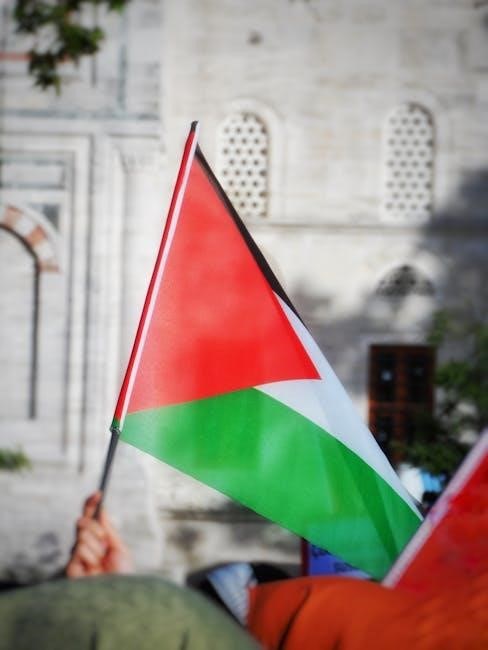
on palestine noam chomsky pdf
Noam Chomsky’s work on Palestine critically examines the Israeli-Palestinian conflict, advocating for justice and human rights. His writings offer deep insights into the region’s history and politics.
1.1 Overview of Chomsky’s Stance on the Israeli-Palestinian Conflict
Noam Chomsky critically analyzes the Israeli-Palestinian conflict, emphasizing the role of power dynamics and U.S. foreign policy. He advocates for Palestinian rights, highlighting Israel’s occupation and Gaza’s humanitarian crisis. Chomsky’s stance underscores the need for international solidarity and grassroots activism to achieve justice and self-determination for Palestinians.
1.2 Key Themes in Chomsky’s Writings on Palestine
Chomsky’s writings on Palestine focus on human rights violations, Israeli occupation, and U.S. foreign policy. He critiques media bias, advocates for Palestinian self-determination, and emphasizes the role of activism. His work highlights the humanitarian crisis in Gaza and the importance of international law in resolving the conflict, urging global solidarity for justice.
The Book “On Palestine” by Noam Chomsky and Ilan Pappé
Co-authored by Noam Chomsky and Ilan Pappé, this book provides a critical analysis of the Israeli-Palestinian conflict, focusing on Gaza’s crisis and its broader implications, available as a PDF.
2.1 Summary of the Book’s Main Arguments
Noam Chomsky and Ilan Pappé’s On Palestine critiques Israel’s policies, highlighting human rights violations, occupation, and Gaza’s humanitarian crisis. They argue for Palestinian self-determination and international accountability, emphasizing the role of grassroots activism. The book underscores the need for global solidarity to address the conflict’s root causes and achieve justice, offering a compelling analysis of the Israeli-Palestinian conflict’s complexities.
2.2 The Collaboration Between Chomsky and Pappé
The collaboration between Noam Chomsky and Ilan Pappé in On Palestine brings together two leading voices in the struggle for Palestinian rights. Their shared commitment to justice and historical accuracy underscores the book’s authority. Chomsky’s analytical depth and Pappé’s historical expertise create a powerful narrative, offering a comprehensive understanding of the Israeli-Palestinian conflict and its global implications, making their partnership uniquely impactful.

Chomsky’s Notable Works on the Israeli-Palestinian Conflict
Noam Chomsky’s notable works include The Fateful Triangle, a critical analysis of U.S., Israeli, and Palestinian relations, and Gaza in Crisis, addressing the region’s humanitarian struggles.
3.1 “The Fateful Triangle: The United States, Israel, and the Palestinians”
The Fateful Triangle is a comprehensive analysis of the Israeli-Palestinian conflict, examining the role of the U.S. in perpetuating the crisis. Chomsky critiques U.S. foreign policy, highlighting its support for Israel and the suppression of Palestinian rights. The book provides historical context, exploring the geopolitical dynamics and humanitarian toll of the conflict, making it a vital resource for understanding the region’s complexities and ongoing struggles.
3.2 “Gaza in Crisis: Reflections on Israel’s Wars and the Question of Palestine”
Gaza in Crisis, co-authored with Ilan Pappé, addresses Israel’s military campaigns and their devastating impact on Gaza. Chomsky examines the humanitarian toll, blockades, and regional instability, offering a critical analysis of U.S. and Israeli policies. The book serves as a powerful critique of the ongoing occupation and advocate for Palestinian rights, providing essential insights into the conflict’s complexities and moral imperative for change.
Geopolitical Implications of the Israeli-Palestinian Conflict
The Israeli-Palestinian conflict shapes regional stability and global power dynamics, with U.S. and international policies significantly influencing the conflict’s evolution and humanitarian outcomes.
4.1 Chomsky’s Analysis of Regional and Global Power Dynamics
Noam Chomsky critically examines how regional and global powers, particularly the U.S., influence the Israeli-Palestinian conflict. He highlights the role of international organizations and the geopolitical strategies that perpetuate instability. Chomsky argues that U.S. support for Israel shapes regional dynamics, while global powers often prioritize strategic interests over humanitarian concerns, exacerbating the conflict’s complexity and its impact on Palestine.
4.2 The Role of International Organizations in the Conflict
International organizations play a significant role in the Israeli-Palestinian conflict. Chomsky argues that while entities like the UN strive for peace, their efforts are often hindered by political and economic interests. He emphasizes that international solidarity and grassroots movements are crucial in advocating for Palestinian rights, as traditional diplomatic channels frequently fail to address the core issues effectively.

Humanitarian Challenges in Gaza
Gaza faces severe humanitarian challenges, exacerbated by blockades and repeated military actions. Chomsky highlights the devastating impact on civilians, emphasizing the urgent need for international attention and action.
5.1 Chomsky’s Discussion of Gaza’s Humanitarian Crisis
Noam Chomsky thoroughly discusses the humanitarian crisis in Gaza, highlighting the impact of blockades, military campaigns, and resource deprivation on civilians. He emphasizes the dire living conditions, limited access to essential services, and the psychological toll on the population. Chomsky underscores the urgency of addressing these issues, advocating for international intervention and accountability to alleviate the suffering of Gazans under prolonged occupation and conflict.
5.2 The Impact of Blockades and Military Actions on Civilians
The blockades and military actions in Gaza have caused severe civilian suffering, with widespread destruction of infrastructure, displacement, and loss of life. Chomsky highlights how these measures exacerbate poverty, limit access to healthcare, and create long-term psychological trauma. The humanitarian toll underscores the urgent need for international intervention to protect civilians and address the root causes of the conflict.

Chomsky’s Critique of U.S. Foreign Policy in the Middle East
Chomsky critiques U.S. foreign policy for its unconditional support of Israel, arguing it perpetuates conflict and undermines Palestinian rights, destabilizing the region and fostering global resentment.
6.1 U.S. Support for Israel and Its Implications
Chomsky argues that U.S. support for Israel perpetuates the Israeli-Palestinian conflict, enabling military actions and settlement expansion. This support undermines Palestinian self-determination and exacerbates regional instability. Chomsky emphasizes that such policies contradict international law and human rights principles, fostering global criticism and solidarity movements advocating for Palestinian rights.
6.2 The Role of Media in Shaping Public Perception
Chomsky critiques media bias in covering the Israeli-Palestinian conflict, arguing it distorts public perception by marginalizing Palestinian voices. He emphasizes how skewed narratives shape empathy and solidarity, often ignoring the realities of occupation. This selective reporting, Chomsky contends, fosters misinformation and limits understanding of the conflict’s complexities, highlighting the need for diverse, independent sources to counteract such biases.
The Role of Activism in Promoting Palestinian Rights
Chomsky emphasizes the importance of grassroots movements and international solidarity in promoting Palestinian rights, asserting that popular activism is essential to drive meaningful change.
7.1 Chomsky’s Advocacy for Grassroots Movements
Chomsky strongly advocates for grassroots movements, emphasizing their role in challenging oppressive systems. He believes that local activism and community organizing are crucial in advancing Palestinian rights and countering injustice. By empowering individuals and communities, these movements can apply pressure on governments and institutions to adopt more equitable policies and support self-determination.
7.2 The Importance of International Solidarity
Noam Chomsky underscores the critical role of international solidarity in supporting Palestinian rights. Global movements and alliances amplify local efforts, challenging injustices and advocating for equality. Chomsky emphasizes that collective action across borders can pressure governments to adopt ethical policies and hold leaders accountable, fostering a united front for justice and human rights in Palestine.

The Legal and Moral Dimensions of the Conflict
Noam Chomsky’s analysis highlights the legal and moral implications of the Israeli-Palestinian conflict, emphasizing violations of international law and the need for accountability and justice.
8.1 Chomsky’s Views on International Law and Palestine
Noam Chomsky argues that Israel’s actions in Palestine violate international law, emphasizing the illegality of settlements and occupations. He underscores the importance of upholding human rights and self-determination for Palestinians, critiquing the U.S. and Israel for disregarding legal frameworks. Chomsky’s analysis aligns with global consensus on the conflict’s legal dimensions, advocating for accountability and justice.
8.2 The Question of Self-Determination and Human Rights
Noam Chomsky emphasizes the fundamental right of Palestinians to self-determination, aligning with international human rights principles. He critiques Israel’s policies as undermining Palestinian autonomy and violating basic human dignity. Chomsky advocates for global solidarity to uphold these rights, asserting that justice for Palestine is inseparable from broader struggles for freedom and equality worldwide.
Chomsky’s Interviews and Public Discussions on Palestine
Noam Chomsky’s interviews and public discussions on Palestine are vocal and insightful, offering a deeper understanding of the conflict’s complexities and his advocacy for justice and rights.
9.1 Key Insights from Chomsky’s Interviews
Noam Chomsky’s interviews on Palestine reveal his vocal critique of Israeli policies and U.S. support, emphasizing the need for justice and human rights. He discusses the historical roots of the conflict, the impact of occupation, and the role of international solidarity. Chomsky’s insights highlight the moral and political urgency of addressing Palestinian rights, advocating for grassroots activism and global pressure to achieve a just solution.
9.2 The Significance of Public Dialogue in Addressing the Conflict
Public dialogue plays a crucial role in addressing the Israeli-Palestinian conflict by fostering understanding and empathy. It challenges narratives, raises awareness, and promotes peaceful solutions. Chomsky emphasizes the importance of open discussions in influencing public opinion and policy. Through dialogue, global voices can unite, advocating for justice and human rights, ultimately contributing to a more informed and engaged international response to the conflict.
Accessing Chomsky’s Work on Palestine in PDF Format
10.2 The Importance of Digital Access to Scholarly and Activist Materials
Digital access to Chomsky’s works on Palestine ensures global reach and accessibility. It democratizes knowledge, enabling researchers, activists, and the public to engage with critical perspectives. PDF formats allow easy sharing and dissemination, fostering education and advocacy. This accessibility is vital for raising awareness and promoting informed discussions on the Israeli-Palestinian conflict and its humanitarian implications.
10.1 Availability of “On Palestine” and Other Works as PDFs
Noam Chomsky’s “On Palestine” and other works are widely available in PDF format, accessible through various online platforms. These digital versions enable easy downloading and sharing, ensuring global accessibility. The PDFs are often accompanied by additional materials, such as bibliographical references and indexes, enhancing their academic and activist value. This accessibility facilitates widespread dissemination of Chomsky’s critical perspectives on the Israeli-Palestinian conflict and its geopolitical implications.
Digital access to scholarly and activist materials like Chomsky’s works on Palestine is crucial for global engagement. PDFs enable immediate dissemination, bypassing physical barriers, fostering awareness and activism. This accessibility democratizes knowledge, allowing researchers, activists, and the public to engage with critical analyses, promoting informed dialogue and advocacy for Palestinian rights on an international scale.
Leave a Reply
You must be logged in to post a comment.